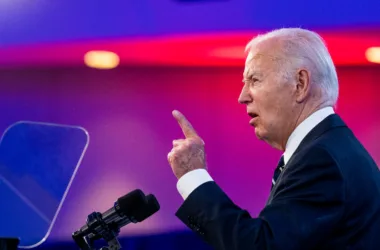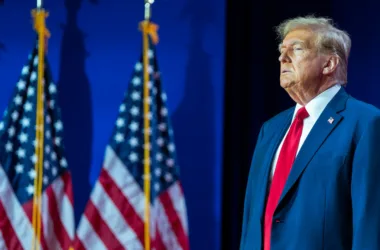In Taiwan’s upcoming presidential election, Terry Gou, the founder of Foxconn, announced on Monday that he will be running as an independent candidate, putting an end to months of speculation.
During a news conference, Gou criticized the Democratic Progressive Party, which currently governs Taiwan. He stated that their policies have “brought Taiwan into the risk of war” with China, as China claims Taiwan as part of its territory.
Gou added, “I will definitely not allow Taiwan to become the next Ukraine.”
Gou believes that Taiwan needs new approaches to address economic and domestic issues. He stated, “Domestically, the national policy direction is filled with all sorts of mistakes. There’s no way to solve the difficulties of Taiwanese industry and people’s livelihoods.”
Foxconn, also known as Hon Hai Precision Industry Co., is a major supplier to Apple and operates many factories in China that produce iPhones.
Gou’s political beliefs align most closely with the Kuomintang, the opposition party in Taiwan that has a friendly stance towards China. The Kuomintang considers Taiwan and China to be part of one country, named the Republic of China. The party ruled over China in the early 20th century but lost the civil war to the Communist Party, leading them to retreat to Taiwan in 1949 with the goal of eventually reclaiming the Republic of China.
Gou has had presidential ambitions for a long time. He attempted to run as the Kuomintang candidate in 2019 but was unsuccessful. Earlier this year, Gou expressed his support for New Taipei City Mayor Hou Yu-ih, after he lost the party’s primary.
Experts believe that Gou is unlikely to become a frontrunner in the presidential race.
Gou’s speech emphasized the importance of unity, as he has faced criticism for potentially splitting the vote. “It’s a demonstration of his political power,” said Hsiao Hsu-Tsen, a former deputy secretary-general of the presidential office who frequently comments on Taiwanese politics.
Since Gou is running as an independent candidate without the support of a major political party, he must collect public signatures to qualify for the ballot.
However, this requirement is challenging to meet, as it requires obtaining 1.5% of the voting population’s signatures in Taiwan. This amounts to approximately 290,000 signatures, according to Yeh-lih Wang, a professor of politics at National Taiwan University.
The other candidates for the January 13th election include Ko Wen-je, the former mayor of Taipei City, representing the Taiwan People’s Party, and Lai Ching-te, the current Vice President from the Democratic Progressive Party. Incumbent President Tsai Ing-wen is serving her second term and cannot seek re-election.
Currently, Lai is considered the front-runner, with Ko and Hou trailing in various polls.
Wang, the political science professor, stated that Gou has never obtained more than 20% of support in polls against the other three candidates.
Although Gou always believed he could unite the opposition, Wang believes that this is unlikely to happen.
Gou expressed that he believes he has something to offer on topics important to the Taiwanese people.
“I have not seen substantive discussions of policy recently, especially on the topics of cross-strait relations (with China), economic development, or international relations,” he said.
Gou emphasized the importance of unity in Taiwanese society, as unity is critical for Taiwan’s future.








